- Home
- Chris Ryan
Masters of War Page 5
Masters of War Read online
Page 5
He looked through a small window just to his right. It was almost fully dark now, but the reflection of the moon on the water, combined with the lights from the Sea Knight itself, showed how close to sea level they were flying. There couldn’t be more than ten feet between the chopper and the water. The Med remained undisturbed despite the proximity of the skimming aircraft, but it was a reminder of how bright the moon was that he could make out a faint shadow of the Sea Knight on the flat surface.
Danny’s earpiece crackled into life. A member of the flight crew communicating with the SF ops room on the aircraft carrier. ‘Zero, this is Desert Wanderer. Requesting permission to cross from water on to land. Repeat, requesting permission to cross from water on to land.’ They’d already had a briefing with the pilot so he could explain their flight plan. Danny pictured their location on the mapping, near the southernmost point of the Gulf of Sirte, fifty klicks west of Brega.
A five-second pause. And then, as clearly as if he were on the Sea Knight with them, he heard the familiar voice of the ops officer – a broad-shouldered American major who was also liaising with the ops room back at Hereford. ‘Desert Wanderer, that’s an affirmative. The op is still a go.’
Ten seconds later they made land. A deserted beach where the flight crew extinguished the chopper’s lights and started flying blind. Through the window, the ground beneath them resembled a fast-moving photographic negative. ‘Welcome to the dark continent, gentlemen,’ the pilot’s voice came over the comms. ‘That’s twenty minutes till target.’
Danny turned his eyes back to the inside of the chopper. Boydie, Tommo and Five Bellies were still sitting in silence, their faces calm as they mentally prepared themselves for their insertion. Danny was doing the same, reminding himself in simple terms of their objective: insert by helicopter, tab to a predetermined location in view of the deserted encampment where the militants were thought to be, set up an OP about a kilometre from the encampment and try to get a visual on the militants themselves. If they did, they were to laser-mark so fast air could come in and bomb the place to hell.
Theirs was a non-offensive role. The real violence would be done by the bombs of the RAF Tornado squadron once the patrol had marked the target and given the go-ahead. That didn’t mean it was safe. You could stare at a patch of satellite mapping till you were cross-eyed, but it wouldn’t tell you half of what you needed to know about the terrain of an insertion zone. You’d be an idiot to think any time spent on the ground in a country like Libya wasn’t a risk. Eighteen months earlier an SAS patrol had been compromised by a group of farmers. It had sounded comical to everyone back home, and the papers had enjoyed a good laugh at the Regiment’s expense. To Danny it had simply highlighted one thing: on unfamiliar ground you had to expect the unexpected. Sometimes a stray farmer could fuck your mission just as surely as a landmine. And although Gaddafi might have assumed a horizontal position while the rebels who ousted him were scrabbling around to form a government, the situation on the ground was still extremely volatile – not to mention the international news crews crawling round the place, sniffing for stories.
The pilot’s voice again. ‘Patrol commander, we’ve flown over the main highway. One vehicle, heading east.’
‘Roger that,’ Boydie replied in a flat voice, his face betraying no emotion.
The loadie was holding up the fingers of one hand. ‘Five minutes till target.’ Danny checked his watch. 23.08 hrs. On schedule. Each member of the patrol disconnected his radio from the Sea Knight’s comms system, before picking up their packs and settling them on their shoulders. Through the open tailgate, Danny could just make out the dark shadow of the desert floor zooming past ten feet below.
The loadie had moved to the tailgate end of the fuselage, where he was holding up three fingers. Three minutes till target.
Two minutes.
One.
Danny engaged his NV. The world changed. The four apertures of his fifth-generation goggles – two for each eye – afforded him a wide field of view and excellent peripheral vision. He had a full panorama of the chopper’s interior, both the tailgate and the sides of the fuselage to left and right cast clearly in green and black. There had been a time when wearing NV meant you could only see what was directly in front of you, like looking through a Smarties tube. Not any more.
A sudden change in the pitch of the Sea Knight’s engines. A lurch as it lost speed quickly. A shudder as it made land. The loadie’s voice, urgent, shouting over the engine noise. ‘You’re on the ground! Go!’
The flight crew wanted to be airborne and out of Libyan airspace as soon as possible, and the patrol wanted the same. The longer the Sea Knight was on the ground, the higher their risk of being compromised. Boydie led them down the tailgate, and Danny felt the crunch of hard-baked earth under his feet. They were surrounded by a brown-out of dust. Above him there was a neon glow where the particles of sand sparked against the spinning rotors, causing a double halo over the chopper. Even though Danny was expecting it, he had to control a moment of anxiety. Those halos were always brighter than you expected them to be. If everything had gone according to plan, they’d set down in a deep wadi. But the desert was dark and flat, and glows such as this could be seen from several kilometres away.
Instinctively, and in a matter of seconds, the patrol formed a defensive position, fanning out in a semicircle in the dust cloud around the tailgate, about five metres apart and with Danny at the leading edge. He threw himself flat on the ground, his bergen to one side, aware that the other three were doing the same, and lay there, his weapon engaged. Visibility was zero in the brown-out. He was aware simply of a dusty glow all around him. But as the chopper took to the air again, the glow faded, along with the sound of the engines, as the rotors rose clear of the dust. The brown-out settled. Through it, Danny saw the Sea Knight silhouetted against the full moon, before its massive black body angled northwards and it headed back towards the coast.
Silence fell gradually.
Clarity returned.
The men neither moved nor spoke.
Danny’s eyes probed and scanned the landscape. They had a ten-minute window during which they could recall the Sea Knight if there was any hint that they’d inserted into a hot LZ. After that, they were on their own.
The wadi was about twenty metres wide, its jagged walls some ten metres high. In the winter this dried-up river bed would be quite an oasis. Even though Danny was lying parallel with the length of the wadi – a direction he knew to be facing almost precisely due west – the wide field of vision of his NV goggles revealed fissures in the walls. About wide enough for a man to hide in, he estimated, but not if he was wearing a bergen. No matter. Their expected lying-up point was five klicks from here, where the topography of the land would afford them a place to hide, if their intel was correct.
Rocks littered the bed of the wadi. Vegetation was very sparse, but the occasional plant had managed to force itself up through the earth. Danny scanned for movement, paying particular attention to any rock sufficiently large to act as a hiding place. His ears were as alert as his eyes. Now that the Sea Knight was no longer in earshot, he knew that he could very well hear an enemy threat before he could see it: the crunch of footsteps, the telltale sound of a weapon being cocked. But the desert air was silent. Not even the sound of wind in this channel that could easily act as a—
Movement. Thirty metres to his eleven o’clock. There was a large rock, strangely similar in shape to a smart car, with one flattened, weathered end. Danny had seen its outline change. Only momentarily, but perceptibly. There was definitely something – or someone – behind that rock.
Slowly, silently, he shifted the direction of his weapon.
He was on the point of breathing a warning to the others into his boom mike when a shrill scream cut through the air. It sounded almost human, and for a split second he thought it was. But then he saw a four-legged creature, about the size of a fox, scamper from behind the rock. It ran five metre
s towards the edge of the wadi, then stopped suddenly and looked back towards where the patrol was lying in the dirt. Its eyes glowed brightly in Danny’s NV, and for a moment he had the impression that this desert creature was staring right at him. But then it scampered off again, quickly covering the remaining three metres to the edge of the wadi, where it disappeared into a fissure.
The patrol relaxed as one. They continued to lie still, scanning for movement, for another minute before Danny heard Boydie’s voice in his earpiece. ‘Zero, this is Charlie Alpha Five. We’re good to go.’
A pause, and then the voice of the American ops officer back on the ship. ‘Charlie Alpha Five, this is Zero. Message understood.’
And then silence once more.
Boydie was the first to get to his feet. The other three followed suit. Danny disengaged his NV and gave his eyes thirty seconds to readjust. He tightened the straps of his bergen, then switched on the GPS unit taped to his personal weapon. Under the clear open skies, the device quickly triangulated itself, confirming that they had inserted at the correct location. Danny switched it off to kill the light from the screen, then looked over his shoulder and gave Boydie a thumbs up.
They tabbed in single file, Danny at the front, then Boydie, followed by Tommo and Five Bellies. The moon was bright enough to cast shadows on the bed of the wadi. Hardly ideal – cloud cover would have concealed them more effectively – but they could only work with what they had. They kept a distance of ten metres between them. Enough to stop them being a single, bunched-up target in the event of a contact, not so much that they could lose sight of each other in the darkness, or miss a hand signal from the guy in front. Weapons at the ready, all senses alive to the possibility of the tiniest threat, they started to tab west along the wadi.
Average walking speed with full pack and personal weapon, two klicks per hour. The terrain around them barely changed, except for a six-foot-deep ditch running at right angles across the wadi two klicks from their insertion point, which they boxed around rather than try to negotiate in the dark. After ninety minutes Danny held up one hand to bring the company to a halt and checked their location on the GPS. The first waypoint was 300 metres farther up the wadi. Time check: 00.47 hrs. Another hand gesture, like a forward karate chop, and the patrol moved on.
They found it five minutes later. From above, the satellite imagery had indicated a triangular cavity cut away from the wadi’s southern edge, approximately seven metres wide at the opening and extending ten metres from the wadi. As an LUP it was adequate – enough space to leave their packs and neatly concealed from the desert floor above by overhanging rock. All four members of the patrol wordlessly entered the crevice and set about removing from their packs everything they’d need for the next stage of the operation: two Claymore mines, the laser target designator, a padded case with the necessary optics, a collapsible steel entrenching tool and a hessian sheet. One side of the hessian sheet was sprayed in the sandy brown of the desert, the other fixed to a sheet of chicken wire to allow it to be fashioned into whatever shape was required. Right now it was folded into a neat, rigid square.
Once they’d gathered all their equipment, Danny ventured back out into the wadi with his utility knife. It took about five minutes to locate and cut sufficient vegetation to cover their packs. When he returned, the others had lined them up at the end of the crevice, in reverse order of march and with the straps facing outwards. If they had to leave in a hurry, they didn’t want to be fumbling around for the right pack. Danny layered the foliage over the bags. It wouldn’t stand up to detailed scrutiny, but it was better than nothing. ‘OK, fellas,’ Boydie told them, keeping his voice low. ‘We’ve got four hours till sunrise. Let’s recce and set up the OP.’
They continued along the wadi for 400 metres. Then the depth of the side walls decreased rather suddenly. By the time Danny’s GPS indicated that they were at their second waypoint, the walls were little more than three metres high. They found an area of wall that was sufficiently sloping for them to climb up it, then hunkered down on the flat desert plain. Five Bellies was carrying the optics pack. He lay down flat, removed a kite sight and scanned the horizon to the south. ‘I’ve got a visual,’ he said almost immediately. ‘Bedouin village, about one klick.’ He lowered the kite sight and looked round at his companions. ‘Let’s dig,’ he said.
The ditch that would serve as an OP didn’t need to be very big – six foot by four, and about a foot deep, enough for two guys to lie side by side. The most important thing was that it offered line of sight on the village – that, rather than distance, was the crucial factor when it came to laser-marking a target. The hard ground was tough to penetrate. Danny unfolded the entrenching tool and used the pointed metal shovel to hack into the ground while Five Bellies kept stag, leaving Boydie and Tommo to lay the Claymores. They unwound the detonation wires, laying the mines in opposite directions along the wadi, the first two at 100 metres either side of the OP and the rest at 100-metre intervals. By the time they’d returned, Danny, sweating and dust-covered, had loosened the earth and was digging out the trench. The guys spread the displaced earth on the desert floor, and in half an hour they had a trench deep enough for two of them to lie in. Boydie unfolded the reinforced hessian and moulded a few random undulations into it before laying it on top of the trench and appraising it critically.
‘Good work,’ he said. As he spoke, a lone cloud drifted across the moon, wiping out their shadows for the first time that night. ‘Great fucking timing,’ Boydie muttered. He looked at his watch – 02.13 hrs – before addressing Tommo and Five Bellies. ‘We’ve got three and a half hours till sunrise,’ he said. ‘Tommo, take the LUP and set up comms. Five, find somewhere to keep watch on me and Snapper. We’ll lase the target as soon as we have visual confirmation of the militants.’
The two guys nodded wordlessly. Tommo picked up the entrenching tool and folded it, then both he and Five Bellies melted silently away into the darkness of the wadi.
‘Let’s get comfy,’ Boydie said. ‘Could be a long one. If you need to curl one out, do it now. We’ll try and keep the trench a turd-free zone, eh?’
‘Roger that,’ Danny replied. Neither of them much wanted to hold the plastic bag while the other took a shit, but his bowels were empty. He lifted the hessian from over the trench, moved their equipment into the trench and lay on his front on the left side with his M4 alongside him on the right. Boydie settled down next to him and refitted the hessian cover.
It was cramped in the little trench, almost impossible to move without disturbing their camouflage. It made sense, though, to get everything prepared under cover of night. Boydie laid a selection of foil-packed MREs in the six-inch gap between them, while Danny erected a small tripod and fitted the LTD on it. Taking the kite sight, he looked in the direction of the village. The night-vision scope revealed a hotchpotch of buildings, some permanent, some temporary. He counted four domed roofs, roughly rendered with some kind of daub. They were, he estimated, no more than five metres high. A collection of single-storey, flat-roofed buildings surrounded them. The whole settlement was no more than fifty metres in width, and Danny knew from satellite imagery that it extended the same distance in depth. About twenty metres in front of the village, to eleven o’clock of the OP, there was a parked vehicle. Danny thought he recognised the outline of a Land Rover. There was no sign of movement. It figured that there might not be any humans moving around at this time of night, but a Bedouin village normally meant animals. So far as Danny could see, there were none. Hardly proof positive that the villagers had been driven away, but a pretty good indicator nonetheless. Still, it didn’t mean a thing until they had a positive ID of the militants.
‘What you got?’ Boydie asked quietly.
‘Nothing,’ Danny said.
‘Anyone keeping stag?’
‘It’s a ghost town.’
A pause.
‘Fucking will be soon,’ Boydie said.
05.00 hrs.
&nbs
p; Dawn crept slowly upon them. The desert grew imperceptibly lighter. Danny and Boydie lay silently in the OP, barely moving. They were facing due south, which meant they couldn’t see the sun rising, but the new day was barely twenty minutes old before Danny felt the sun growing hot on his left side and sweat started to seep from his skin. He sipped a ration of water from his CamelBak, then changed the kite sight for a new Leica spotting scope more suited to daytime use. Already the whole area was shimmering in a heat haze. There was no sign of Bedouin. No animals. No nothing.
Danny lowered the optic, grabbed one of the MREs and ripped it open. The contents were supposed to be heated through – boiled in the bag – but Danny simply squeezed the salty brown stew straight into his mouth. It was fuel, nothing more. Surveillance like this could take a very long time, and it was important to keep his energy levels up. ‘Tastes like shit,’ he murmured, more to himself than to Boydie.
‘Course it tastes like shit,’ Boydie replied. ‘How else they gonna keep us angry enough to kill people?’ He cut himself short. ‘Movement,’ he said. His voice was terse. Business-like.
Danny had barely swallowed a mouthful, but he dropped the MRE and looked through the scope again. Sure enough, he saw a vehicle trundling round the eastern side of the village. A Bedouin truck? Like hell. This wasn’t a dirty, run-down van used to transport animal feed. It was an open-topped pick-up, a technical with a top-mounted machine gun and five armed men surrounding it. They were all dressed exactly the same: keffiyehs, bandoliers of ammo strapped round their chests and assault rifles slung around their necks. Kalashnikovs, Danny reckoned, though from this distance it was hard to be sure. Not that it mattered either way. One thing was for sure: these were not ordinary Bedouin.
‘Don’t know about you,’ Boydie said as the pick-up passed between the village and the Land Rover, ‘but I think we just caught ourselves some militants with a .50-cal.’

 Global Strike
Global Strike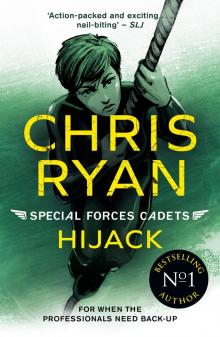 Hijack
Hijack Special Forces Cadets 2
Special Forces Cadets 2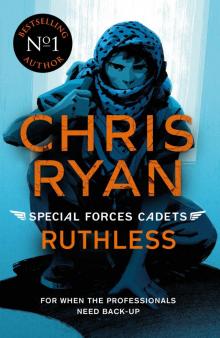 Ruthless
Ruthless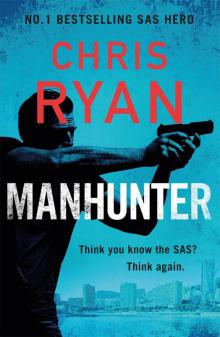 Manhunter
Manhunter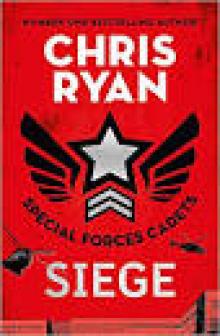 Special Forces Cadets 1
Special Forces Cadets 1 Red Strike
Red Strike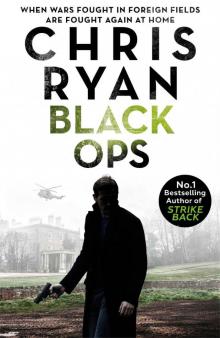 Black Ops
Black Ops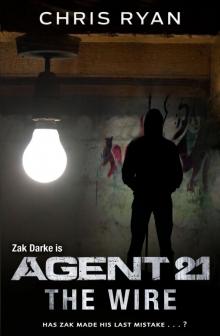 Agent 21: The Wire
Agent 21: The Wire Land of Fire
Land of Fire Alpha Force: Fault Line
Alpha Force: Fault Line Under Cover (Agent 21)
Under Cover (Agent 21)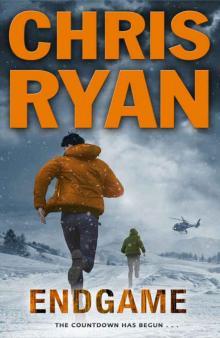 Endgame (Agent 21)
Endgame (Agent 21) Red Centre
Red Centre Blackout
Blackout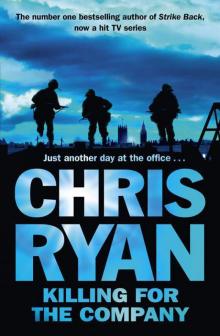 Killing for the Company
Killing for the Company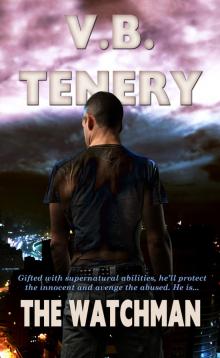 The Watchman
The Watchman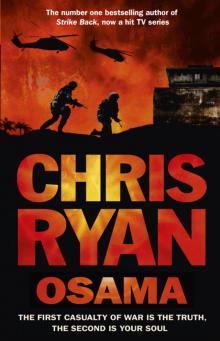 Osama
Osama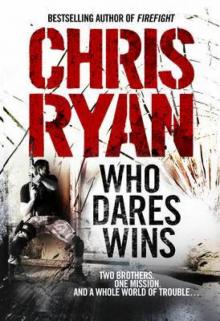 Who Dares Wins
Who Dares Wins The Kremlin Device
The Kremlin Device Hunter Killer
Hunter Killer Alpha Force: Untouchable
Alpha Force: Untouchable Stand By Stand By
Stand By Stand By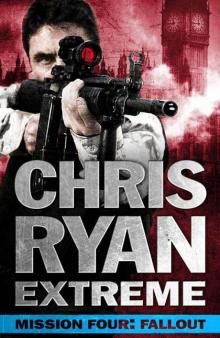 Chris Ryan Extreme: Hard Target: Mission Four: Fallout
Chris Ryan Extreme: Hard Target: Mission Four: Fallout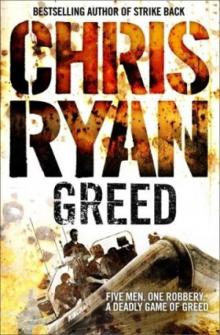 Greed mb-1
Greed mb-1 Alpha Force: Desert Pursuit
Alpha Force: Desert Pursuit Strike Back
Strike Back Greed
Greed The Bay Bulls Standoff
The Bay Bulls Standoff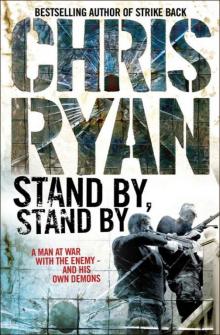 Stand By, Stand By gs-1
Stand By, Stand By gs-1 Outbreak
Outbreak Hunted
Hunted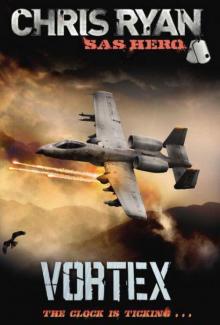 Vortex cr-4
Vortex cr-4 Rat-Catcher
Rat-Catcher Vortex
Vortex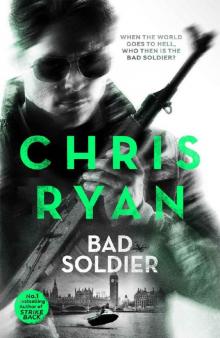 Bad Soldier
Bad Soldier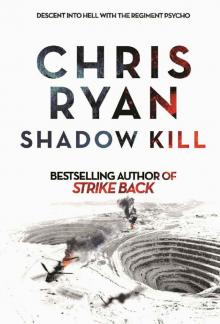 Shadow Kill: A Strikeback Novel
Shadow Kill: A Strikeback Novel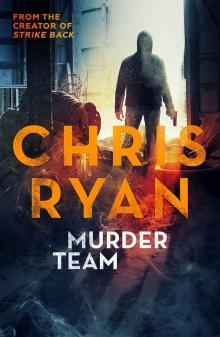 Murder Team (Kindle Single)
Murder Team (Kindle Single) One Good Turn
One Good Turn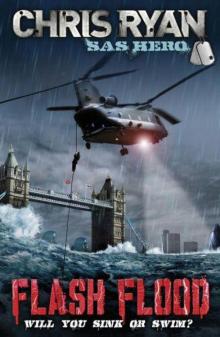 Flash Flood cr-1
Flash Flood cr-1 Night Strike
Night Strike Wildfire
Wildfire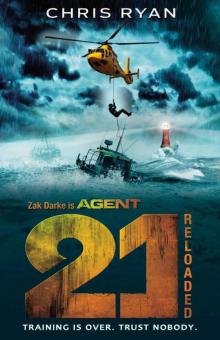 Agent 21: Reloaded: Book 2
Agent 21: Reloaded: Book 2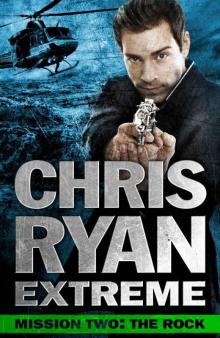 Chris Ryan Extreme: Hard Target: Mission Two: The Rock
Chris Ryan Extreme: Hard Target: Mission Two: The Rock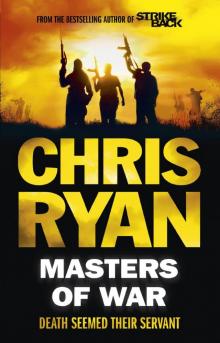 Masters of War
Masters of War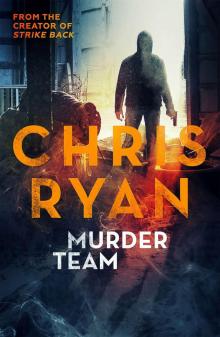 Murder Team
Murder Team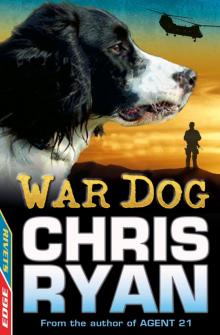 War Dog
War Dog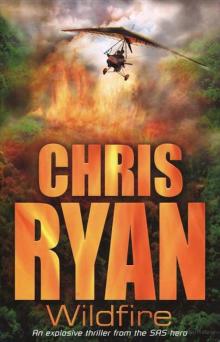 Wildfire cr-2
Wildfire cr-2 Survival
Survival The One That Got Away - Junior edition
The One That Got Away - Junior edition The Hit List
The Hit List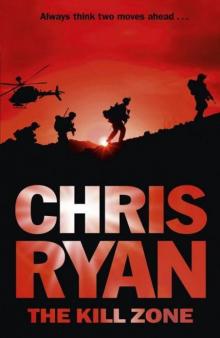 The Kill Zone
The Kill Zone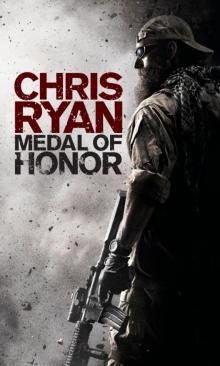 Medal of Honor
Medal of Honor Battleground
Battleground Twister
Twister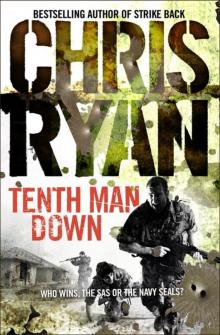 Tenth Man Down gs-4
Tenth Man Down gs-4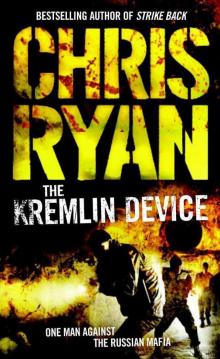 The Kremlin Device gs-3
The Kremlin Device gs-3 Hostage
Hostage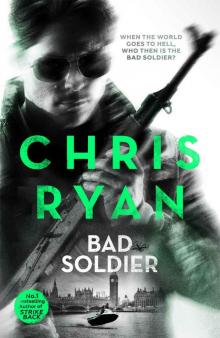 Bad Soldier: Danny Black Thriller 4
Bad Soldier: Danny Black Thriller 4 Alpha Force: Blood Money
Alpha Force: Blood Money Firefight
Firefight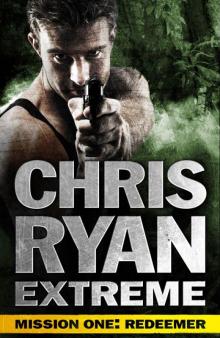 Chris Ryan Extreme: Hard Target: Mission One: Redeemer
Chris Ryan Extreme: Hard Target: Mission One: Redeemer Hit List
Hit List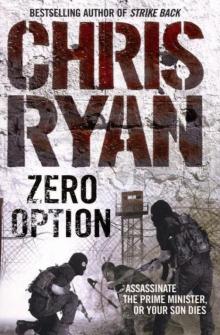 Zero Option gs-2
Zero Option gs-2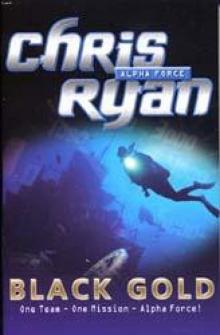 Black Gold
Black Gold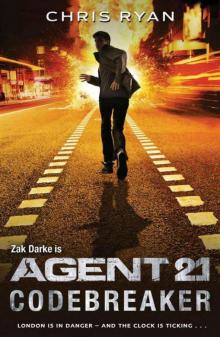 Agent 21: Codebreaker: Book 3
Agent 21: Codebreaker: Book 3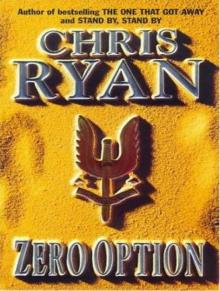 Zero Option
Zero Option Ultimate Weapon
Ultimate Weapon Tenth Man Down
Tenth Man Down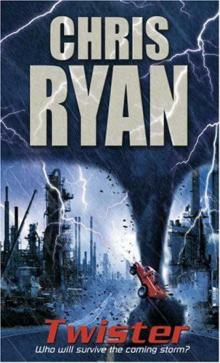 Twister cr-5
Twister cr-5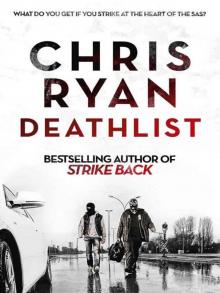 Deathlist
Deathlist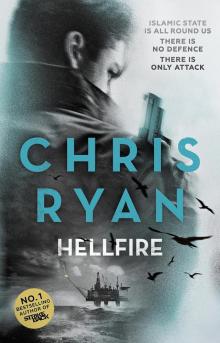 Hellfire
Hellfire Flash Flood
Flash Flood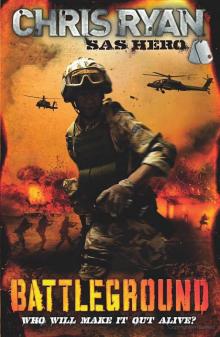 Battleground cr-6
Battleground cr-6 The Increment
The Increment